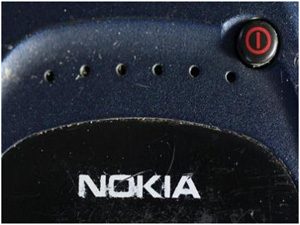



Date:26/07/12
 Struggling Finnish cellphone maker Nokia has scrapped a software project which it had hoped would compete with mass-market Google Android phones, three sources with direct knowledge of the company's plans said.
Struggling Finnish cellphone maker Nokia has scrapped a software project which it had hoped would compete with mass-market Google Android phones, three sources with direct knowledge of the company's plans said.
Nokia was hoping the Linux-based software platform, code-named Meltemi, would replace its ageing Series 40 software in more advanced feature phones, but has killed the project as part of its massive cost-cutting drive.
Scrapping the platform means loss-making Nokia will risk losing its strong position in the mass-market -- where phones are priced at $100-$200. Nokia controlled more than 20 percent of this market in the first quarter, according to research firm IDC.
Nokia's Chief Executive Stephen Elop flagged Meltemi in a leaked video in mid-2011, but Nokia has never officially confirmed Meltemi existed. It declined to comment on Thursday.
In June, Nokia said it would cut 10,000 jobs - one in five staff in its phone business - as it aims to pull the company out of the red. Talks over job cuts are scheduled to end this week in Finland.
One of the sources, who works at a supplier, said the original plan was for the first feature phones using Meltemi should to be on the market by now.
Smartphones such as Apple's iPhone which offer a platform for third-party application developers, is where the industry's strongest growth is. But simpler feature phones, with limited support for third-party software, still account for most units sold.
Nokia's Series 40 platform are in around 2 billion cellphones, making it the most ubiquitous software in the market. But it lacks the smartphone-like experience Meltemi could have offered.
Google's Android platform has stormed the smartphone market in its first few years. Last quarter it was used in roughly 60 percent of all smartphones sold.
Nokia last year dumped its own smartphone software platforms in favor of Microsoft's Windows Phone, which has so far had a limited impact, in part due to the high prices of phones using it.
Nokia scraps new mass-market phone software: sources
 Struggling Finnish cellphone maker Nokia has scrapped a software project which it had hoped would compete with mass-market Google Android phones, three sources with direct knowledge of the company's plans said.
Struggling Finnish cellphone maker Nokia has scrapped a software project which it had hoped would compete with mass-market Google Android phones, three sources with direct knowledge of the company's plans said.Nokia was hoping the Linux-based software platform, code-named Meltemi, would replace its ageing Series 40 software in more advanced feature phones, but has killed the project as part of its massive cost-cutting drive.
Scrapping the platform means loss-making Nokia will risk losing its strong position in the mass-market -- where phones are priced at $100-$200. Nokia controlled more than 20 percent of this market in the first quarter, according to research firm IDC.
Nokia's Chief Executive Stephen Elop flagged Meltemi in a leaked video in mid-2011, but Nokia has never officially confirmed Meltemi existed. It declined to comment on Thursday.
In June, Nokia said it would cut 10,000 jobs - one in five staff in its phone business - as it aims to pull the company out of the red. Talks over job cuts are scheduled to end this week in Finland.
One of the sources, who works at a supplier, said the original plan was for the first feature phones using Meltemi should to be on the market by now.
Smartphones such as Apple's iPhone which offer a platform for third-party application developers, is where the industry's strongest growth is. But simpler feature phones, with limited support for third-party software, still account for most units sold.
Nokia's Series 40 platform are in around 2 billion cellphones, making it the most ubiquitous software in the market. But it lacks the smartphone-like experience Meltemi could have offered.
Google's Android platform has stormed the smartphone market in its first few years. Last quarter it was used in roughly 60 percent of all smartphones sold.
Nokia last year dumped its own smartphone software platforms in favor of Microsoft's Windows Phone, which has so far had a limited impact, in part due to the high prices of phones using it.
Views: 1081
©ictnews.az. All rights reserved.Similar news
- Mobile operators of national market to reduce roaming tariffs
- Iran vows to unplug Internet
- China Targeting Telecoms in Corruption Probe
- Bangladesh to use electronic voting system for next elections
- Philippine IT sector to launch five-year digital strategy plan
- Russian Premier Vladimir Putin meets ITU Secretary-General Hamadoun Touré
- US lawmakers propose to regulate use of geolocation data
- Unlimited mobile data plans dying as telcos gear up for cloud future
- Europe at risk of falling behind US and Asia on 4G use
- Netherlands first to regulate on net neutrality
- Korean Co Takes Aim At Display Patents
- Regulators, Banks Look for IT Hires After Breakdowns
- Electron transactions spreading
- Schools in remote rural areas will connect to the single database via network without SIM
- Obama to Personally Tweet From Twitter Account





















